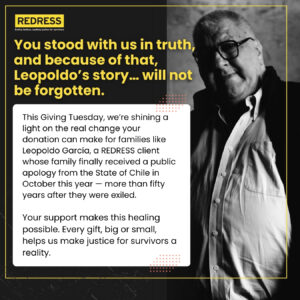Publications
REDRESS’ publications are also available in hard copy format. Please contact us for further information on [email protected].
This submission provides evidence on the use of immigration detention in the UK, outlining the need for UK immigration policy to be principled, coherent and effective in supporting those feeling torture and ill-treatment, with allegations of torture effectively investigated; perpetrators brought to justice and victims afforded reparations.
In this briefing paper, the Uganda Victims Foundation identifies the categories of victims, types of interim support needed, processes necessary to meet the reparative needs and proposed time frames that the government policy should target for interim reparations. UVF is mindful that the government has to mobilise resources if it is to meet these interim needs, however it must be recognised that the categories of victims listed herein have lived in inhuman and degrading circumstances from the time of their victimisation until today and hence there is a clear need for urgent intervention. We hope that this Briefing Paper may constitute a useful point of departure to discuss and implement interim measures and thus assist the many victims of the conflict in Uganda.
REDRESS has submitted a list of issues to the UN Human Rights Committee in relation to the UK’s failure to meet some of its obligations under the International Covenant on Civil and Political Rights (ICCPR). REDRESS seeks the inclusion of these concerns in the list of issues to be taken up during the examination of the UK by the Committee during its session to be held from 7-31 October 2014 in Geneva. Some key concerns are the UK’s insufficient attempts to investigate public officials who have been accused of committing torture, as well as the alleged complicity of the UK in US rendition flights. REDRESS has also drawn attention to the need for the UK to properly deal with allegations of involvement in torture and inhumane treatment by the UK armed forces in Iraq and the alleged sexual abuse by security guards in Yarl's Wood Immigration Removal Centre.
REDRESS provided a submission to the Special Rapporteur on the Promotion of Truth, Justice, Reparation and Guarantees of Non-Recurrence on the ways in which victims’ views can be included as an integral part of framing, developing and pursuing prosecutorial strategies in transitional justice contexts.
This paper calls for the elaboration of minimum standards for reparations programmes in response to mass violations. International law recognises that victims of gross violations of human rights and serious violations of international humanitarian law have the right to an effective remedy, including reparation, and that it must meet certain minimum legal standards. However, those standards are not always reflected in the political negotiations leading up to the establishment of administrative reparations programmes.
This paper argues that now is a crucial moment to specifically and authoritatively articulate minimum legal standards for administrative reparations programmes. Such standards are important for domestic policy makers, victims’ groups, and the international community involved in advocating for and supporting such programmes, and are crucial to ensure that victims’ rights are reflected in reality.
REDRESS together with Advocacy Forum Nepal and TRIAL (Track Impunity Always) submitted this General Allegation to a number of UN Special Procedure mandate holders arguing that the newly adopted Truth and Reconciliation Act in Nepal breaches international law and promotes impunity. Some of the concerns raised in our submission include the power of the Commissions that will be established to award amnesties and to conduct "reconciliation" even without the consent of victims; the lack of guarantees of impartiality and independence of the Commissions, and the non-recognition of victims' right to reparation.
The Victims' Rights Working Group - a network of civil society groups and experts informally facilitated by REDRESS - has issued this paper highlighting the group’s views on the system of victim participation before the International Criminal Court (ICC). The paper will be used as an advocacy tool with both the Court and States Parties and was presented at the informal consultations of the Hague Working Group on victims, affected communities and the Trust Fund for Victims that were held on 17 June 2014 at the ICC.
REDRESS and the African Centre for Justice and Peace Studies (ACJPS) have brought to the attention of the UN Human Rights Committee the "serious, ongoing human rights crisis" in Sudan, marked by widespread and ongoing human rights violations. In a report submitted to the Committee, which will be reviewing Sudan's human rights record on 8 and 9 July 2014, the organisations document the continued use of stoning, amputation and whipping in Sudan in violation of Sudan’s human rights obligations. They also draw attention to the killings and torture of hundreds of students, activists, journalists and human rights defenders by the intelligence and security forces, and the gross violations being carried out in armed conflicts in Darfur, South Kordofan and Blue Nile.

